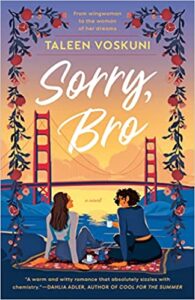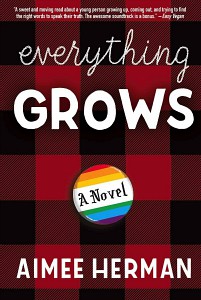Amazon Affiliate Link | Bookshop.org Affiliate Link
Armenian culture and self discovery are primary themes in Sorry, Bro by Taleen Voskuni. These themes are the strengths of the book, especially when it comes to culturally sensitive issues and heavier topics like genocide, racism, homophobia within the Armenian community. On the other hand, Sorry, Bro also has one of the most extremely infuriating main characters I have ever encountered in a sapphic romance. It’s less of a romcom and more of a journey of self discovery, where our main character takes one step forward and three steps back. It reads a little like a YA book at times, despite having a main character in her late 20s, as Nareh’s development into adulthood feels like it went off track when her father died. She still lives in her childhood bedroom with her high school posters tacked to the wall and a curfew. Nareh is heavily invested in how people in her community and family perceive her, needing their praise and acceptance, even though she’s not really involved herself in the community and feels disconnected from it.
One of the main issues for me comes at the beginning, when, not 48 hours after her boyfriend of almost five years proposes and she subsequently turns him down, Nareh announces she’s on the prowl for a new fella. No mourning period, no me-time, it’s just time to go to the Man Store and get something in a size handsome-with-a-sharp-jawline. Nareh is bisexual, but aside from her male friends, she doesn’t seem to really like the men that she thinks are “her type.” She approaches potentially dating them in a very detached way, not unlike her mother, who’s been making Nareh spreadsheets of eligible Armenian bachelors. This goes on for a couple of chapters longer than I had patience for, to be honest. A lot of these qualities make Nareh feel quite shallow.
Nareh is solidly in the closet, afraid of the fallout from her community should she come out as bi, and also perhaps wary after making out with too many straight girls in college and getting burned. But no matter how hard she tries to focus on finding a Armenian husband, she keeps getting distracted by her new, very attractive friend Erebuni, who it turns out is *not* straight. Like the book, it takes a while to get to our secondary character. Erebuni is the polar opposite of Nareh—she’s confident, doesn’t care what people think of her, and has a tight knit group of Armenian friends. Unfortunately, she doesn’t get much time on the page, and if she does, it seems she is always surrounded by other people. Erebuni never really feels like a main character, more of a prop for Nareh.
As a romance, Sorry, Bro has some room for improvement. But as a book about self-discovery and finding one’s place in the world in the context of culture, community, and societal pressure, it’s worth a read.


